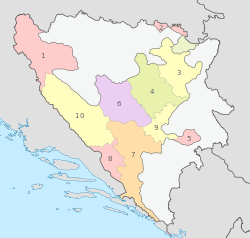Canton of the Federation of Bosnia and Herzegovina
| Cantons of the Federation of Bosnia and Herzegovina Kantoni Federacije Bosne i Hercegovine Кантони Федерације Босне и Херцеговине |
|
|---|---|
 |
|
| Category | Federal unit |
| Location | Federation of Bosnia and Herzegovina |
| Number | 10 Cantons |
| Populations | 25,336 (Bosnian-Podrinje Canton Goražde) – 477,278 (Tuzla) |
| Areas | 325 km2 (125.5 sq mi) (Posavina) – 4,934 km2 (1,905.1 sq mi) (Canton 10) |
| Government | Canton government |
| Subdivisions | Municipality |
The ten cantons of the Federation of Bosnia and Herzegovina (Bosnian: kanton, Croatian: županije; Serbian: Кантон), one of the two political entities of Bosnia and Herzegovina, were established by the Law on Federal Units (Cantons) on 12 June 1996.
The cantons of the Federation of Bosnia and Herzegovina were created by the Law on Federal Units (Cantons) of 1996, which was based on the Bosniak-Croat Washington Agreement. The cantons consist of municipalities. A canton has its own government headed by a prime minister. The prime minister has his own cabinet, and is assisted in his duties by various cantonal ministries, agencies, and cantonal or county services. Five of the cantons (Una-Sana, Tuzla, Zenica-Doboj, Bosnian Podrinje, and Sarajevo) have a Bosniak majority, three (Posavina, West Herzegovina and Canton 10) have a Bosnian Croat majority, while two of them (Central Bosnia and Herzegovina-Neretva) are 'ethnically mixed', meaning neither ethnic group has a majority and there are special legislative procedures for the protection of their political interests. The most populous canton is Tuzla Canton while Canton 10 is the largest by area.
The term županija has been declared unconstitutional, but is still widely used by Bosnian Croat officials and in cantonal constitutions. The Croatian language version of the Constitution of the Federation, however, uses the constitutional term kanton.
There are a number of propositions for the reorganization of the Federation, ranging from decreasing the number of cantons, establishing new federal units on the state level, to the exchange of jurisdiction between the cantons and the Federation. However, this question requires a high level of political agreement, especially between the Bosniak and Croat political parties, since it would necessarily include changing the federal constitution. For a constitutional law to pass, it has to obtain the support of the majority of the representatives and delegates in both chambers of the Federal parliament, including the majority of Croat and Bosniak delegates in the House of Peoples.
...
Wikipedia
